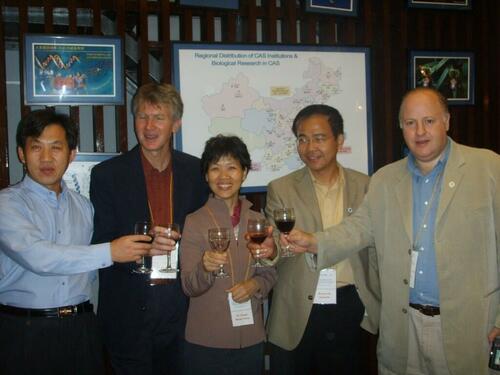USAID Stonewalls Over $4.7 Million 2021 EcoHealth Grant
The US Agency for International Development (USAID) gave embattled Wuhan lab collaborator EcoHealth Alliance a $4.67 million grant in late 2021, despite the New York-based nonprofit coming under intense scrutiny after leaked documents revealed that founder Peter Daszak applied for a grant to release enhanced airborne coronaviruses into the wild in an effort to inoculate them against diseases that could have otherwise jumped to humans, according to The Telegraph, citing leaked grant proposals from 2018.

New documents show that just 18 months before the first Covid-19 cases appeared, researchers had submitted plans to release skin-penetrating nanoparticles containing “novel chimeric spike proteins” of bat coronaviruses into cave bats in Yunnan, China.
They also planned to create chimeric viruses, genetically enhanced to infect humans more easily, and requested $14million from the Defense Advanced Research Projects Agency (Darpa) to fund the work. -Telegraph
Yet, despite EcoHealth’s shocking attempt to create exotic strains of bat covid – in the middle of a pandemic, for which ground zero was the city he was previously genetically modifying bat covid in (and failed to report an ‘accidental’ gain-of-function outcome), USAID decided to move forward with a nearly $5 million grant to EcoHealth, according to the Washington Examiner‘s Jerry Dunleavy.
You’ll recall that Daszak was also part of the WHO team that dismissed the lab-leak theory as “extremely unlikely,” as well as the February 2020 Lancet letter which dismissed the hypothesis that his colleagues could be behind this as a conspiracy theory.
And get this, “the grant awarded to EcoHealth Alliance will implement the Conservation Works Activity in southwest Liberia,” a USAID spokesperson told the Examiner. “CWA partners will work with local communities to improve farming practices and sustainable opportunities that reduce reliance on land, wood, or wildlife in conservation areas.”
The project began Oct. 26, 2021, just six days after the National Institutes of Health revealed that EcoHealth had violated the terms of its grants with the agency, with NIH revealing further violations in January.
The Washington Examiner asked USAID officials if the problems with NIH were considered, as well as the fact that the Wuhan lab is considered by U.S. intelligence to be the plausible origin of COVID. USAID did not answer any of those questions directly. -Examiner
“CWA was competitively bid and awarded,” a USAID spokesperson said. “EcoHealth Alliance has experience monitoring wildlife and understanding forest-disease dynamics in Liberia, and its consortium partners have substantial experience with protected area management and rural development in Liberia.”
As Dunleavy notes, more than two dozen House Republicans shot a letter to USAID Administrator Samantha Power this week.
“[We are] deeply concerned by this award given EcoHealth and Dr. Daszak’s troubling record of failing to report findings from federally funded research, refusing to cooperate with congressional oversight of federal funding awarded to the organization, and collaborating with the Wuhan Institute of Virology,” the letter reads, adding that USAID’s PREDICT program provided $1.1 million to Daszak’s nonprofit between 2009 and 2019, with funds allocated for a sub-agreement with the Wuhan Institute of Virology. They added that USAID provided a further $2.5 million in funding between 2011 and 2021.
Emails show EcoHealth sought to delay the release of taxpayer-funded viral sequences early in the COVID-19 pandemic in part because Chinese authorities had not yet approved the data’s release. Daszak urged his colleagues in a late April 2020 email to delay the release of the data to a public NIH database because it would bring “very unwelcome attention” to “PREDICT and USAID.”
EcoHealth’s website touts its involvement in USAID’s PREDICT program, saying it “works at the leading edge of this field by building local capabilities and testing high-risk wildlife” in places such as China.
EcoHealth has received tens of millions of dollars from the U.S. government in recent years, including $6.99 million in 2021, with the aforementioned $4.67 million from USAID as well as $2.075 million from NIH. A government funding database shows EcoHealth received $25.1 million in 2020, including $21.26 million from the Pentagon’s Defense Threat Reduction Agency plus $2.49 million from NIH. -Washington Examiner
Read the rest of the report here.
Tyler Durden
Wed, 02/09/2022 – 17:10
via ZeroHedge News https://ift.tt/vYTMFb9 Tyler Durden